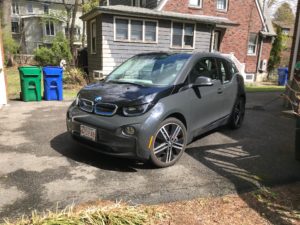
My Beloved I3
In 2015 I purchased an electric vehicle, a BMW i3. It was not a hybrid, but it had a range extender, a small gas motor, that kicked in to charge a tapped-out battery and extend the range by about 50 miles. The combined range of the i3 is about 150 miles in the summer, less in cold weather.
That limited range worked well for us in the Newton area and to and from our Vineyard cottage. The BMW is beautifully engineered, comfortable, and peppy. With tax breaks, its cost diminished to about $35,000, not too different from other new cars. Nothing goes wrong with it. Once we installed Level 2 charging stations in both places, we were secure in its operation. It takes about three hours for such a station to recharge a tapped-out i3.
The rub? BMW assured us that in a few years all the major highways would install Level 3 charging stations for electric vehicles- it hasn’t happened yet. Level 3 stations recharge tapped-out vehicles in 20-40 minutes; you can stop for a cup of coffee or lunch while your car is charging. Right now only Teslas have such stations, and they work only for Teslas. Such Level 2 stations found along the way take twice as long to charge as ours at home. Thus, it is impractical to take our electric vehicle to Hartford, let alone New York City.
Unless local, state, and federal government collaborate with the automobile industry to install Level 3 stations, electric vehicles like mine have limited use. Those stations consume lots of power and their creation will require subsidies and fees. I am quite willing to pay for charging at a rate competitive to what gas guzzlers pay at the pump.
For electric vehicles to make ecological sense, the power feeding them should derive from renewable sources. That is true for us at home; we have solar panels that provide a large portion of the electricity we use, including for our BMW. If the electricity comes from a fossil-fuel plant, then their impact on climate change diminishes.
Nonetheless, I remain a supporter of electric vehicles, and I hope that the Garden City gets involved in making them more practical. They run quietly and efficiently; they keep our local air clean and free of particulate matter. Presently, gasoline automobiles contribute about a third of the carbon dioxide that causes global warming. Though electrical vehicles will not solve our climate crisis, in theory they can greatly lower that percentage. It will require, however, a partnership between the public and private sector to make this goal come to pass.

I am in support of changing our habits to make any cars unnecessary.
I know, one can dream …